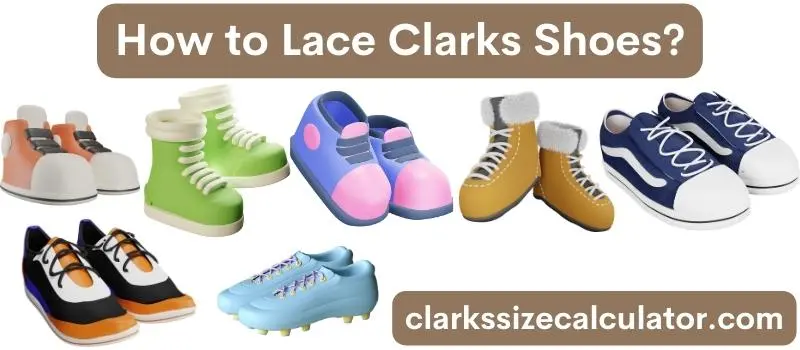How to Lace Clarks Shoes?
If you choose the correct lacing method when lacing your Clarks shoes, you can make a significant difference in their comfort and fit. With a variety of lacing techniques available, you can address specific foot shapes and fit issues. In this article, we will examine different lacing techniques and provide step-by-step instructions that will help you lace your Clarks shoes with confidence, whether you wish to prevent slippage, accommodate wide feet, or achieve a secure heel lock. Now let’s find the ideal lacing solution for you.
How to Lace Clarks Shoes?
In order to properly lace your Clarks shoes, you may choose from a variety of lacing techniques based on the shape and fit of your feet. Different lacing patterns are available to address a wide foot and high instep in addition to preventing slippage. Find out how to lace your Clarks shoes flawlessly with the Criss-Cross, Straight-Lace, and Heel-locking Methods. The following sections provide step-by-step instructions and visual guides.
Throughout the upcoming sections, we will provide comprehensive instructions and tips on how to apply each lacing technique to your Clarks shoes in order to achieve the perfect fit. Keep reading for the secrets to lacing your Clarks shoes like a pro, whether you are looking to secure your heel, accommodate a narrow foot, or find the ideal lacing method for wide feet and high insteps.
Method #1 : The Criss-Cross Method – Classic and Versatile
The Criss-Cross Method is one of the most commonly used lacing methods, especially for Clarks loafers. Here is an outline of how to lace Clarks loafers using this technique:
- Begin by inserting each end of the shoelace from the inside through the two frontmost opposite-facing holes on the shoe.
- Insert the right end of the shoelace into the next left hole from the top, working in a diagonal direction.
- As you insert the shoelace into the right hole from the top, repeat the process with the left end of the shoelace.
- Continue this criss-cross pattern until the top of the shoe is reached, alternating between the right and left ends.
- As you tighten the laces, ensure that they are evenly tensioned.
- To secure the laces, tie a knot or bow at the top.
- If you desire a cleaner appearance, you may insert the lace from the front of the shoe inward rather than going from the inside and pointing outward. This method provides a more polished appearance.
Method #2 : The Straight-Lace Method- Simple and Efficient
Straight-lace lacing is a great option if you prefer a more straightforward lacing method. Follow these steps to achieve it:
- Start by inserting one end of the shoelace into the top right hole (the toe end) and the other end into the bottom left hole (near the beginning of the shoe).
- There should be a short length of lace left in the left hole, sufficient to tie the lace at the end.
- Insert the right end of the shoelace into the opposite hole in a straight line.
- The lace should be removed from the bottom and inserted through the next hole (from the bottom again).
- Repeat this horizontal movement until the last hole is reached, threading the lace across the holes.
- As you progress, ensure that the laces are evenly tensioned.
- Secure the laces by tying a knot or bow at the top.
- Providing a clean and streamlined appearance to your Clarks shoes, the Straight-Lace Method offers simplicity and efficiency.
Method #3: The Heel-locking Method – Addressing Heel Slippage
The Heel-locking Method is specifically designed to prevent heel slippage for those with narrow heels or shoes requiring additional stability. Here is how this technique is employed:
- Starting from the bottom, begin lacing your shoes using the Criss-Cross Method.
- Once you have reached the last hole, stop.
- Insert the lace on one side into the hole on the same side.
- Insert the lace into the corresponding hole on the other side.
- Insert the left lace through the loop created on the right, and vice versa.
- Tighten the laces evenly.
- The last step is to tie your shoes in the manner you would normally do, either with a knot or a bow.
You can minimize slippage and enhance overall comfort by using the Heel-locking Method.
Method 4: Bar Lacing for Clarks Boots
If you wish to barlace your Clarks boots, you should follow the steps below, which provide added stability and ensure a secure fit.
1. Insert the lace into the bottom eyelets of the boot, ensuring that each side of the lace is the same length.
2. Insert the left lace diagonally through the next higher eyelet on the right side.
3. Insert the right lace diagonally through the next higher eyelet on the left side.
Continue this crisscross pattern by lacing each lace diagonally through the next higher eyelet on the opposite side.
You should repeat this process until you reach the top of the boot.
To ensure a snug fit, adjust the laces to achieve the desired level of comfort and support.
Secure the laces firmly by tying a knot or bow at the top.
Method #5: Formal Straight Bar Lacing for Clarks Dress Shoes
You can add a touch of elegance to your Clarks dress shoes by lacing them using the straight bar lacing method. Follow the steps below to achieve a sleek and sophisticated look.
- The lace should be inserted into the bottom eyelets of the shoe, leaving an equal length on both sides.
- Insert the left lace directly upwards through the next higher eyelet on the right.
- The left lace should be inserted directly upwards through the next higher eyelet on the left side.
- As you continue lacing the shoe, alternate between the left and right laces until you reach the top.
- To ensure a comfortable fit, adjust the laces so that they are tight but not excessively tight.
- Secure the laces in place by tying a knot or bow at the top.
Different Lacing Techniques for Shoe Fit Problems
Various foot shapes and sizes can be accommodated with Clark’s shoes. You may, however, make simple changes to your lacing technique if you experience specific fit problems, including wide feet, narrow heels, wide insteps, or heel slippage. Some lacing patterns can help alleviate common shoe fit issues.
1. Lacing to Prevent Slippage:
To prevent your heel from sliding out of your Clarks shoe, you can use the lace lock at the top of your shoe. Lace up each shoe from the bottom of the second-to-last eyelet on each side. Then, lace over and down through the top eyelet of the same side to form a “bunny ear.” Repeat this process on the other side. Finally, lace through the opposite eyelet you formed between those two eyelets. By using this technique, you can achieve a secure fit for the ankle while leaving the top of the foot comfortably loose.
2. Lacing for a Narrow Foot:
You can draw the two sides of your Clarks shoes together more tightly if you lace them through the eyelets closest to the tongue if you have a narrow foot. In addition, you can also use the lace lock technique between the second and third eyelets if necessary. This prevents the laces from loosening throughout the day. Lace down the next eyelet on the same side to form a “bunny ear” and repeat. In the final step, lace through the opposite “bunny ear” formed between those two eyelets, continuing the diagonal lacing pattern.
3. Lacing for Wide Feet and High Instep:
The window lacing technique can alleviate pressure on the instep for those with wide feet and high insteps. Lacing through the eyelets closest to the tongue may provide more room and a more comfortable fit. By lacing directly from the lower eyelets to the higher eyelets, you create a window-like pattern by skipping the eyelets in the middle section of the shoe.
Remember, you can combine or modify these lacing methods to suit your specific foot shape and fit requirements. Feel free to experiment and find the method that works best for you.
Tips for Keeping Shoelaces Secure
Here are some helpful tips for keeping your laces secure throughout the day:
1. Double-Knotting:
Make an additional loop with each shoelace after tying your shoelaces with a standard knot. Cross the loops over each other and pull them through the opening to form a double knot. This technique makes your shoelaces more secure and prevents them from coming undone.
2. Lace Anchors:
In order to keep laces in place, lace anchors are small accessories that can be attached to them. These anchors act as a lock, preventing the laces from loosening or becoming untied. They are particularly useful for individuals who participate in frequent movement activities.
3. Silicone or Elastic Laces:
If you prefer a more flexible and adjustable fit, consider replacing your traditional laces with silicone or elastic laces. These laces eliminate the need for tying altogether and provide a stretchy and adjustable fit. This type of lace is particularly popular among athletes and those seeking convenience and convenience.
4. Tucking Laces In:
The ends of the shoelaces can be tucked into the shoe’s sides to keep them neatly tucked away and to avoid tripping over them. This is a practical solution for those who prefer a cleaner, more streamlined appearance.
5. Fabric Fasteners:
You may also consider using fabric fasteners, such as hook-and-loop straps or Velcro, as a method of securing your shoelaces. In addition to providing a strong closure system without the need for traditional laces, these fasteners have proven particularly popular among children and individuals with dexterity issues.
Conclusion
The right lacing technique makes a world of difference whether you are wearing Clarks loafers, boots, or dress shoes. It not only enhances the fit, but it also enhances the overall appearance and comfort of your Clarks shoes. There are many lacing methods available, from the traditional criss-cross to the bar lacing and straight bar lacing methods, which all offer a combination of style and function. Moreover, you can optimize the comfort and support provided by Clarks shoes by customizing your lacing approach to address specific fit problems, such as heel slippage or wide feet.
The best way to find your perfect fit is to experiment with different lacing patterns and techniques. Have fun learning new ways to lace your Clarks shoes, and feel the comfort, style, and confidence that comes with wearing well-laced footwear.

